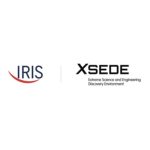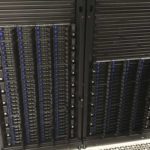An effort to create quantum semiconductors that operate at room temperature has been awarded $1.8 million by the National Science Foundation. The success of the University of Michigan team could lead to the integration of quantum information and communications technologies with conventional computers—as well as advances in high-precision sensing and more sustainable UV lamps for […]
NSF Funds $1.8M for Univ. of Michigan Research for Room Temperature, Controllable Quantum Nanomaterials
Univ. of Michigan Researchers Using TACC Frontera HPC for Space Weather Forecasting
“There are only two natural disasters that could impact the entire U.S.,” according to Gabor Toth, professor of Climate and Space Sciences and Engineering at the University of Michigan. “One is a pandemic and the other is an extreme space weather event.” We’re currently seeing the effects of the first in real-time. The last major space […]
Univ. of Chicago’s Polsky Center Launches Venture Conference for Midwest Deep Tech Startups from Universities and National Labs
CHICAGO– The University of Chicago’s Polsky Center for Entrepreneurship and Innovation is pleased to announce the launch of DeepTechU, a venture conference showcasing deep tech innovation and 48 investor-ready companies from universities and national labs. The virtual conference will take place April 20-22, 2021, and feature quick pitches as well as discussions with industry experts and entrepreneurs. The conference […]
An Update from Women in HPC – Expanding Membership and Mission
In this interview, we hear from two leaders of Women in HPC, the worldwide organization that encourages, mentors and supports women and addresses gender issues in the high performance computing industry. Speaking for the organization are Lorna Rivera, research scientist in program evaluation at the Georgia Tech Center for Education Integrating Science, Mathematics and Computing […]
IRIS and XSEDE to investigate the impact of research supercomputing
A partnership XSEDE and the Institute for Research on Innovation and Science (IRIS) will examine how access to advanced research computing resources and services available via XSEDE affect the collaboration networks and scientific productivity of participating researchers. “IRIS will link the IRIS UMETRICS dataset containing transaction-level administrative data on sponsored research projects from dozens of the nation’s leading higher educational institutions to data from XSEDE allocations. This will result in a new way to examine how access to supercomputers influences the way researchers collaborate with colleagues and the productivity of individuals and research teams.”
Video: Making Supernovae with Jets
Chelsea Harris from the University of Michigan gave this talk at the CSGF 2019. “I am developing a FLASH hydrodynamics module, SparkJoy, to perform these simulations at high order. These projects are part of a DOE INCITE project to explore progenitor effects on CC SNe and of the DOE SciDAC program “Towards Exascale Astrophysics of Mergers and Supernovae.”
Cavium ThunderX Cluster to Crunch Big Data at University of Michigan
Today Cavium announced a new partnership that will position the University of Michigan as a leader in data-intensive scientific research by creating a powerful Big Data computing cluster using dual socket servers powered by Cavium’s ThunderX ARMv8-A workload optimized processors. The cluster consists of 40 servers each containing 96 ARMv8 cores and 512 GB of RAM per server.
Yottabyte Powers Data-Intensive Research at University of Michigan
“With the Yottabyte Research Cloud, researchers will be able to ask more questions, faster, of the ever-expanding and massive sets of data collected for their work,” said Yottabyte CEO Paul Hodges. “We are very pleased to be a part of the diverse and challenging research environment at U-M. This partnership is a great opportunity to develop and refine computing tools that will increase the productivity of U-M’s world class researchers.”
Simulating the Earliest Generations of Galaxies with Enzo and Blue Waters
“Galaxies are complex—many physical processes operate simultaneously, and over a huge range of scales in space and time. As a result, accurately modeling the formation and evolution of galaxies over the lifetime of the universe presents tremendous technical challenges. In this talk I will describe some of the important unanswered questions regarding galaxy formation, discuss in general terms how we simulate the formation of galaxies on a computer, and present simulations (and accompanying published results) that the Enzo collaboration has recently done on the Blue Waters supercomputer. In particular, I will focus on the transition from metal-free to metal-enriched star formation in the universe, as well as the luminosity function of the earliest generations of galaxies and how we might observe it with the upcoming James Webb Space Telescope.”










